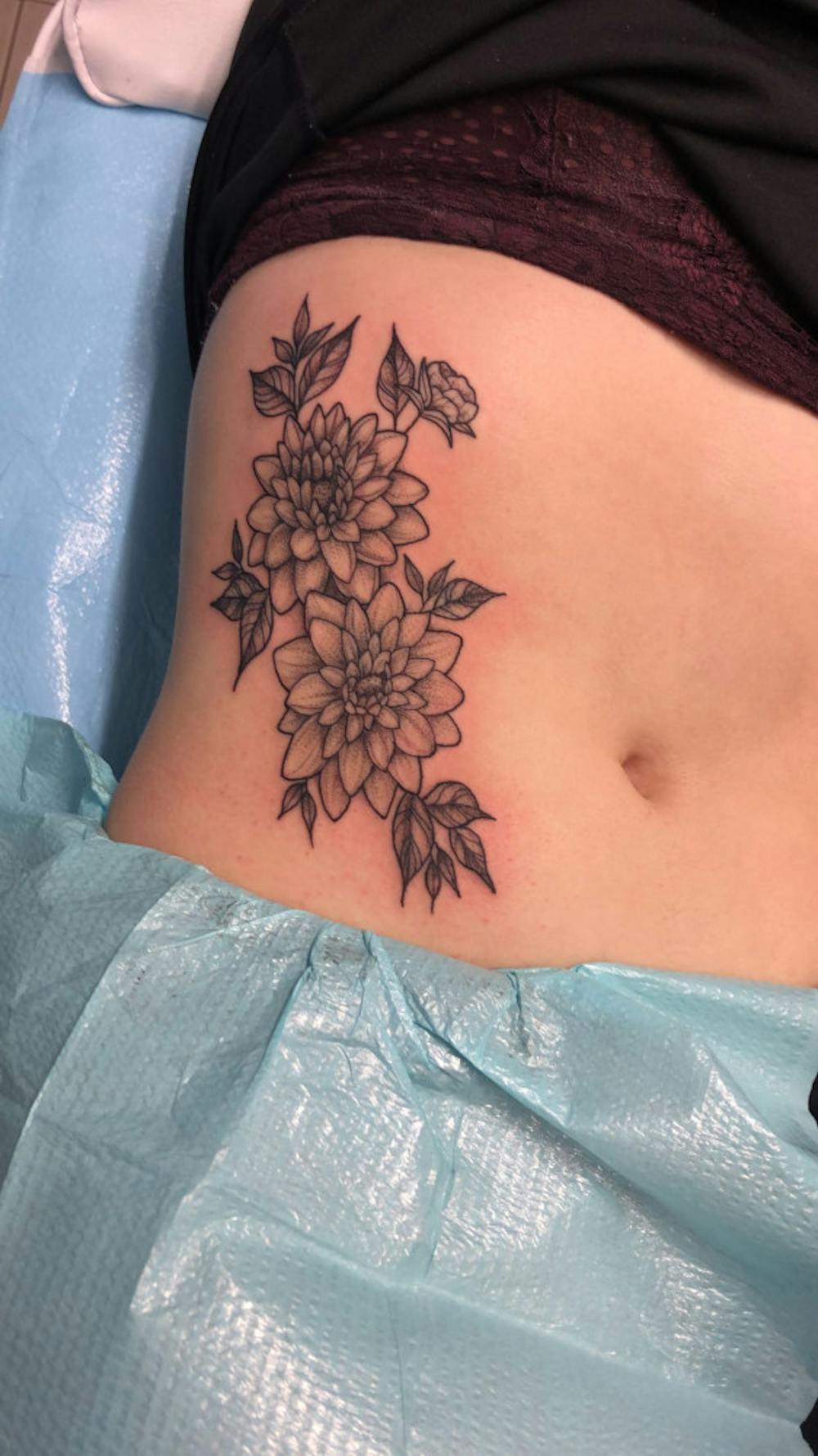By Jane Bowden and Mansi Bhargava
Managing Editor and Correspondent
Growing up, Kayleigh Soucy didn’t like her body. She was bullied for being chubby, but when she started to lose weight, the compliments from her family and peers only fueled an eventual eating disorder and body dysmorphia. That’s why last February, she walked into her local tattoo parlor and was determined to add something beautiful to a part of her body she spent years trying to shrink.

“My flowers are on my stomach, because I’ve always hated that area of my body, so I put something there I would love and would make me feel beautiful,” said the junior mathematics major.
And Soucy isn’t alone. Many students at the College are getting tattoos as a form of self-expression, turning what used to be seen as an act of rebellion into a celebrated norm.
“It’s a piece of your identity displayed on your skin as art,” said Julia Gladstone, a sophomore nursing major.
Gladstone, who has a tattoo of the letter “I” followed by a greater than symbol, an up arrow and then a down arrow on her wrist, said her tattoo signifies that she is greater than her highs and lows. It also relates to her diabetes and portrays “what life is like.”
Much like Gladstone’s, many tattoos serve as a sign of hope that ground people during a difficult period in their lives.
Soucy sees her tattoos as a daily reminder that she’s been through struggles that have only made her stronger — the semicolon on her wrist symbolizes suicide prevention, the quote “Even the darkest night will end and the sun will rise” on her ribs is borrowed from her favorite book, “Les Miserables,” and the flowers on the side of her stomach represent beauty and growth.
“My tattoos remind me that I’m here, I’m human and I’m worthy of happiness,” Soucy said.
Another popular trend for students at the College is getting a tattoo that honors a family member or fond childhood memories.
When Samantha Allen was a sophomore in college, she got her first tattoo on her left wrist of a small beach scene and the word “shine” in her mother’s handwriting. The tattoo reminds her of the time she spent as a child at Island Beach State Park with her family.
Since then, the senior marketing major has added two more tattoos: an edelweiss flower on her ribs and an Aries constellation on her right wrist.
John Brezina, a senior clinical psychology and counseling major, also has a tattoo that relates to his family. Located on his chest, Brezina’s tattoo is a self-designed family crest that resembles the Porsche logo, as his passion for cars is shared by his father and brother. Inside of the logo are the colors of his family’s birthstones, music notes and the word “Believe.”
“I wanted a tattoo that I would be in love with aesthetically, but also one that was laden with meaning, so I spent a lot of time working with it,” Brezina said. “I decided to put it right over my heart, so that if I ever hang my head, I am immediately reminded of why I always push on.”
While many young people are quick to join the ink trend, others refrain from having tattoos altogether due to its permanency, a lack of design ideas or the fear of disapproval from their parents.

Although many worry about this negative reaction, Zane Thompson-Bradley, a junior interactive multimedia major, said his family loves his tattoo of the words “Forever Love Grandma Doreen,” which he got in honor of his grandmother who died in 2013.
“It represents how I will never forget her, what she taught me and that I will always love her," Thompson-Bradley said.
Although tattoos have been traditionally viewed as unprofessional, many employers are becoming open to the concept of hiring workers with tattoos. According to a 2018 study by the University of Miami Business School, 40 percent of young people with at least one tattoo are not at a disadvantage when it comes to employment.
Tait Algayer, a junior biology major, has a tattoo of an endangered species of bird at a beach she grew up near and worked at as a lifeguard for five years. Today, she works at that beach as a biology technician and said that tattoos are more tolerable in the workplace than she expected, as one of her colleagues is covered with them.
As society becomes more accepting of tattoos, people seem to express more freedom and autonomy when it comes to decisions about their bodies.
“I was so close to chickening out when I was sitting in the waiting room before getting my first tattoo, but the second I got it, I have spent every day thinking about my next one,” Brezina said. “It is an absolute obsession I cannot escape, and I can’t wait to get more and continue to turn my body into my new canvas.







